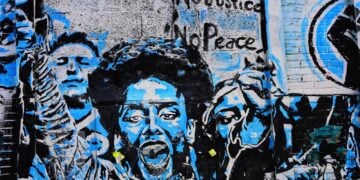This story by Jasmine Mithani was originally published by The 19th.
The Department of Justice website has removed at least two key reports about violence against Indigenous women, including one prompted by legislation signed by President Donald Trump in his first term, as many groups that work to combat intimate partner violence worry about the future of federal funding.
The Bureau of Indian Affairs did not respond to requests for comment about the administration’s commitment to combating violence ahead of Missing and Murdered Indigenous Women’s Day of Awareness, designed to draw attention to the disproportionate rates of violence against Indigenous women.
May 5 is a day of mourning and action for the Indigenous people who have been murdered or remain missing. Many cases remain unsolved, leaving justice out of reach for families of victims. The day has traditionally focused on the crisis of violence against Native American women, girls and two-spirit people, but in recent years has expanded to acknowledge heightened rates of violence across all genders.
The date marks the birthday of Hanna Harris, a citizen of the Northern Cheyenne Tribe who was sexually assaulted and murdered in 2013. Her family was originally brushed off by law enforcement when they reported her missing. In 2018, the Montana legislature passed a law bearing Harris’s name that would make it easier for jurisdictional collaboration in missing persons cases.
Last month, a Trump administration official touted the president’s commitment to delivering justice to Native Americans. The last eight years have seen bipartisan support for legislation aimed at addressing the issue of missing and murdered Indigenous people, and both Trump and President Joe Biden signed executive orders specifically on this issue.
A widely cited 2016 study funded by the National Institute of Justice showing that Native American women were more likely than White women to experience a slew of different types of violence is no longer accessible. The announcement summarizing the study has been removed from the Department of Justice’s website and now redirects to the National Institute of Justice’s home page. The Internet Archive shows the page has been inaccessible since at least February 1.
President Trump signed the Not Invisible Act in 2020 to increase federal coordination between agencies to better address violence against Native Americans. The final report of the commission created by the law is no longer available on the Department of Justice’s website. The Huffington Post reported the missing link on February 18.
While Trump signed the Not Invisible Act into law, much of the work was undertaken during the Biden administration. Deb Haaland, the first Indigenous member of a presidential Cabinet, oversaw its implementation during the Biden administration.
The removed report, a copy of which is available via the National Indian Women’s Resource Center, included recommendations for law enforcement, victims services and data tracking in order to better tackle cases of missing or murdered Indigenous people.
The documents disappeared after Trump signed executive orders eradicating what he terms “gender ideology” in the federal government and removing funding of diversity, equity and inclusion initiatives that he characterized as “illegal and immoral discrimination programs.” When asked about the 2016 report, an official from the Department of Justice said some pages may be unavailable as the Office of Justice Programs “is currently reviewing its websites and materials in accordance with recent Executive Orders and related guidance.”
Taking down these resources pushes back against assurances by Edward Heartney, the U.S. counselor on economic and social affairs to the United Nations, at the United Nations Permanent Forum on Indigenous Issues on April 21.
During a panel on the global rights of Indigenous women, Heartney said the United States is “committed to promoting the rights and well-being of Indigenous women and girls.” He called “economic empowerment” the “cornerstone” of the Trump administration’s support.
On the topic of violence, Heartney cited Trump’s support of Operation Not Forgotten, an initiative launched in 2023 to provide Federal Bureau of Investigation support to field offices with large tribal communities. The resources are specifically focused on addressing unsolved cases of missing and murdered Indigenous people.
Heartney’s remarks were met with silence, as reported by High Country News, and he slipped out of the panel after delivering them.
There are many avenues to address the missing and murdered Indigenous people crisis. Provisions in the 2022 reauthorization of the Violence Against Women Act gave tribal authorities greater latitude to pursue justice against non-tribal perpetrators. Nonprofits focused on providing services to victims of domestic violence are necessary to support victims seeking to escape violence in their homes.
The Office on Violence Against Women at the Department of Justice was created to allocate funding provided by the Violence Against Women Act, first passed in 1994. On February 6, notices of funding opportunities for 2025 were taken down and have not been restored in the nearly three months since.
One of the funding opportunities removed was for the Tribal Governments Program, which in fiscal 2024 distributed over $45 million to 48 grantees. The original grant application for 2025 was due on April 10.
The 19th reached out to numerous organizations focused on supporting Indigenous survivors of domestic violence to ask about how they are navigating challenges with federal funding. All either did not respond to requests for comment or declined to speak on the record.
Domestic violence services remain operational throughout the United States. Confidential, anonymous help is available 24/7 through the National Domestic Violence Hotline (1-800-799-7233) and The StrongHearts Native Helpline (1-844-762-8483).
Learn more about third-party content on ZanyProgressive.com.




